#the greek Jesus
Explore tagged Tumblr posts
Text
Eli Kittim Reddit

#the little book of revelation#elikittim#bible prophecy#ελικιτίμ#bible study#ek#bible#το μικρο βιβλιο της αποκαλυψης#eschatology#christology#soteriology#christian apologetics#εκ#θεολογία#Έλληνας Μεσσίας#the future incarnation of Christ#the Jesus prophecy#the Greek Jesus#the first coming of Jesus at the end of days#the birth death and resurrection of Christ according to the Greek New Testament Epistles#ο Χριστός είναι Έλληνας#Βίβλος#Η πρώτη Παρουσία του Ιησού στο τέλος των Ημερών#Η πρώτη έλευση του Ιησού στο τέλος του κόσμου#Καινή Διαθήκη#ἡ κοινὴ διάλεκτος#Biblical Greek#Hebrews 9:26#1 Peter 1:20#Eli Kittim Reddit
1 note
·
View note
Text
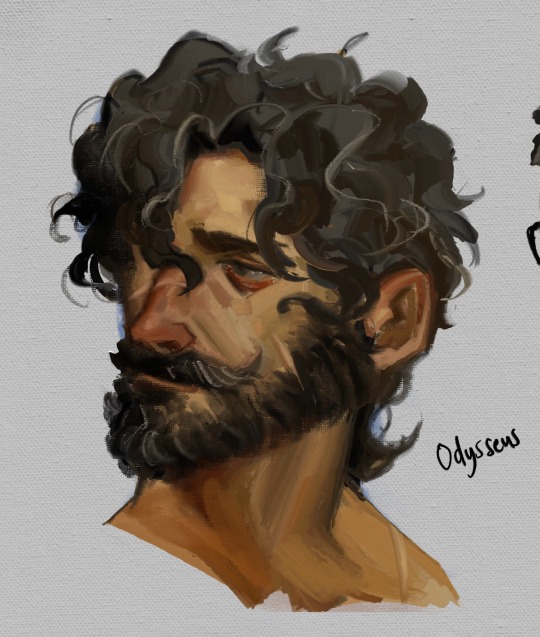


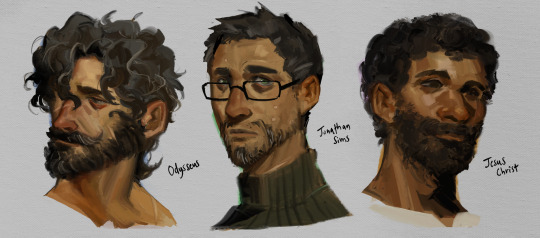
My favorite guys
#thought about adding Phil but my hand started getting tired so alas#art#digital art#odysseus#wolfy religious tedtalks#Jesus Christ#jonathan sims#odyssey#tagamemnon#bible#greek mythology#tma#the magnus archives
6K notes
·
View notes
Text
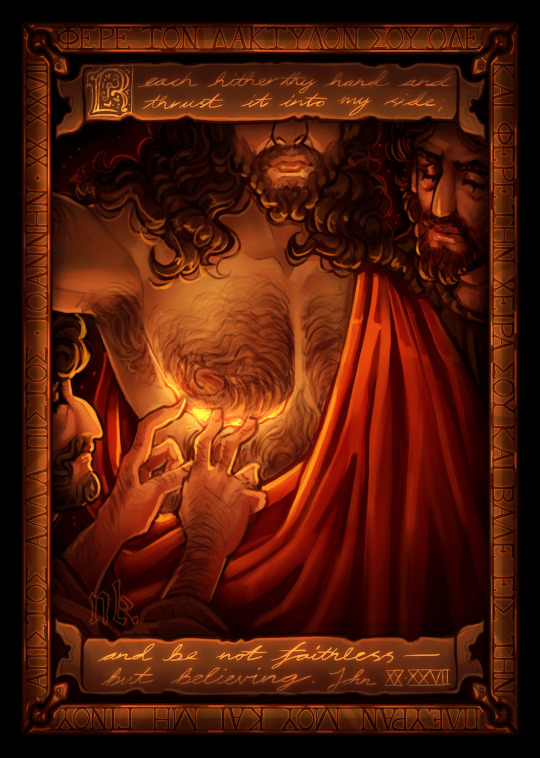
Jesus showing off his top surgery scars to the boys (John. 20:27)
#i'm a professional theologian on master's level so you can bet that any intolerance against this interpretation is null and useless :P#the border is the same passage in koine greek btw#jesus christ#trans jesus#artists on tumblr#digital art#doubting thomas#incredulity of thomas#saint thomas#holy wounds#lance of longinus#religious art#religious imagery#my art#idk what to tag this as please just behave or so help me god#trans#theology
2K notes
·
View notes
Text
So in the context of Greek mythology the tripod is a special three legged stool that the oracle of Delphi sat on when she gave her prophecies. The stool itself was sacred. Very important.
And. There’s a myth where Heracles goes to the oracle of Delphi to ask a question of how to atone for something he did and the Oracle is like “I dunno dude figure it out yourself” and Heracles is so mad about this that he steals the tripod and Apollo himself is like “NO NOT MY TRIPOD” and comes down to snatch it back from him.
Now this is one of those myths that isn’t sourced in a lot of places. Pretty much only The Library by pseudo-Apollodorus I think? But we know it was a very popular and well known myth because artists really really liked painting and sculpting it

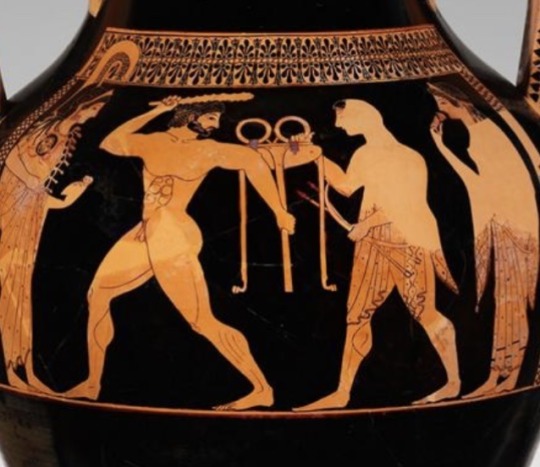
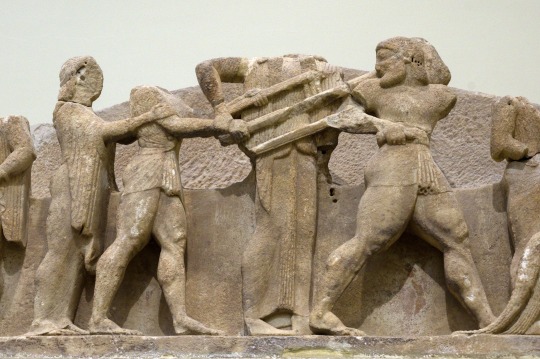

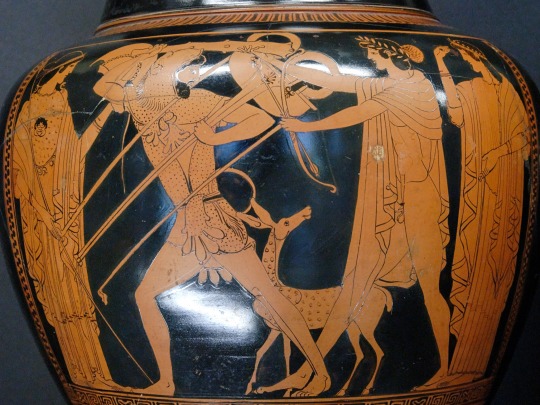
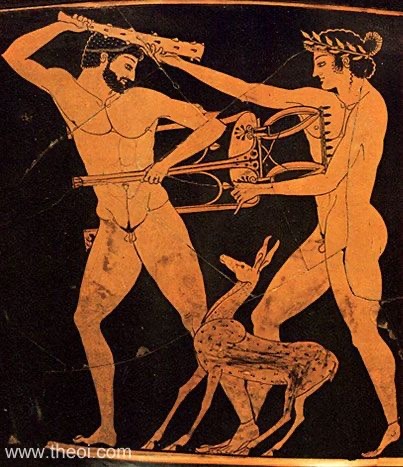
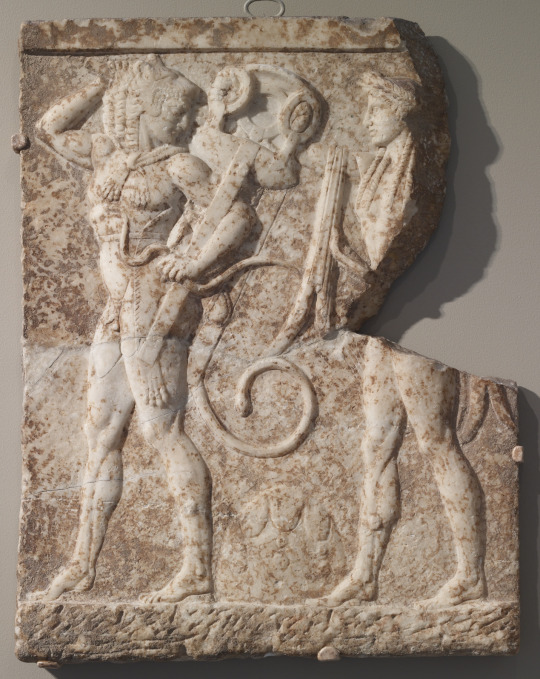
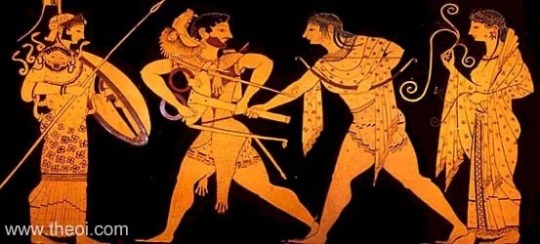

Look at him he’s like bro give it back seriously that’s my chair what do you think you’re doing
#roman said a thing#greek mythology#don’t nuke this one tumblr I swear to sweet baby Jesus this is pottery
9K notes
·
View notes
Text
Potnia Theron
This is about brilliant Artemis her golden arrow, her hunting of deer, her pride in arrows, the sacred virgin, the sister of Apollo in his gold sword, Artemis
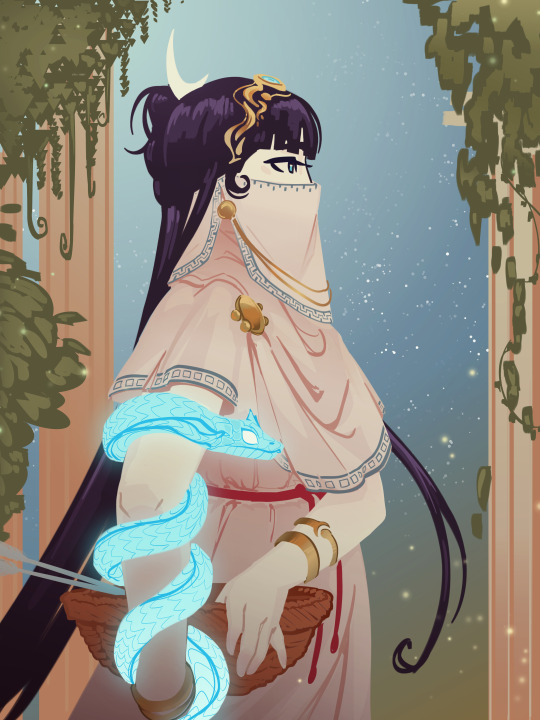

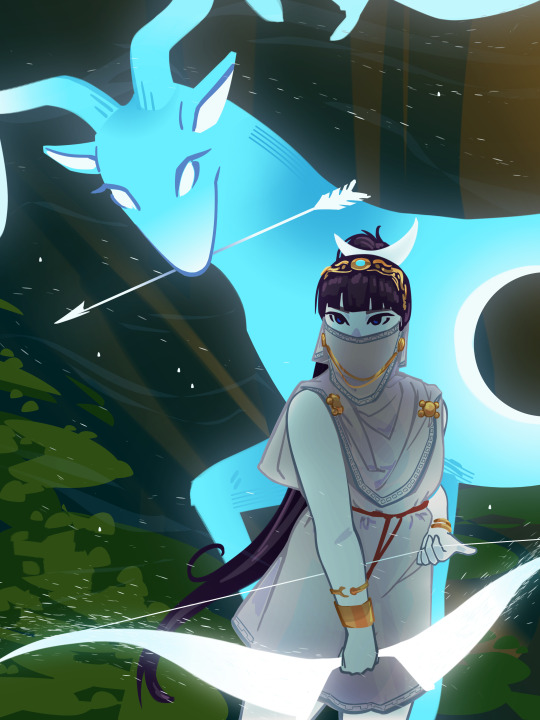
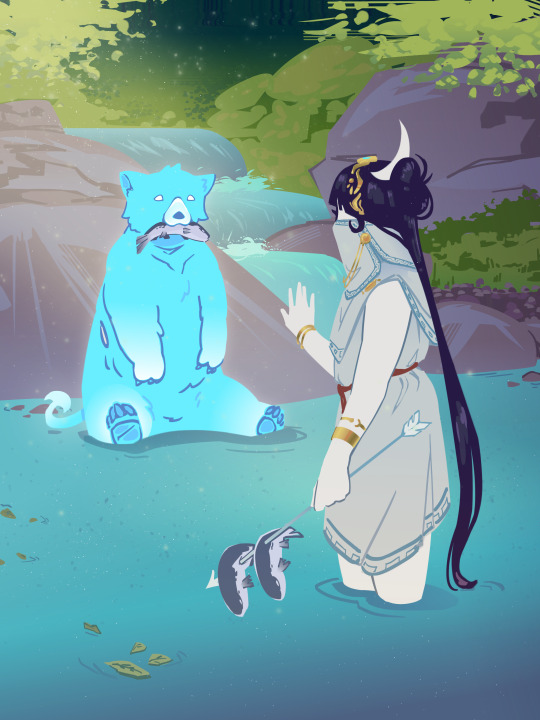
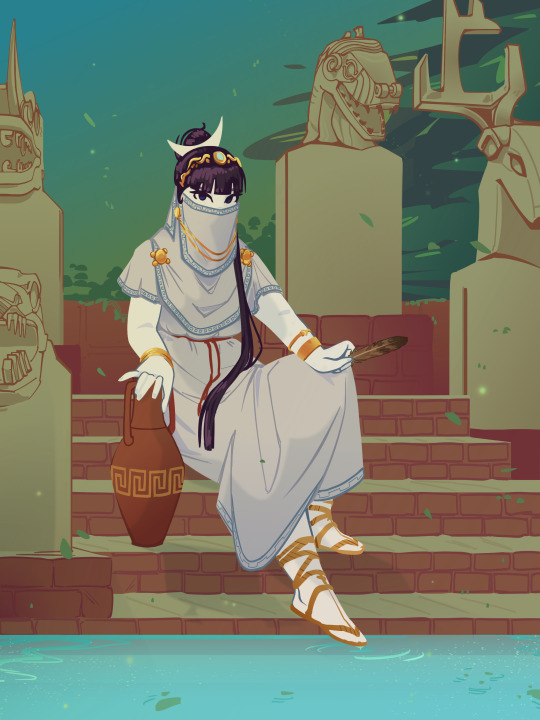
#finally#my hunter artemis#in full glory#took me about 3 months jesus christ i hate university#BUT SHE'S HERE#i will make a post about the process later cause i really like all the references i gathered together in order to make this series#tp#hunter my beloved#my art#art#greek mythology
219 notes
·
View notes
Text
Thinking about the contrast between Thetis and Mary mother of Jesus ok I am NOT crazy just hear me out
I'm thinking about how Mary just got married with a man she loved so deeply and was chosen by her God to give birth to his child, still a virgin. She felt honored. Her womb, a blank canvas that would paint an amazing story. Her son the embodiment of God, characterized by his gentleness and compassion, how he spent the years of his life spreading the word of God, messages about loving one's neighbor and peace. His child, whom she saw die humiliatingly and cruelly in the hands of a people who feared his message of love and peace. Who she saw coming back to her even after death.
And then we have Thetis. Thetis, daughter of Nereus, maybe the fairest one of them all. Zeus and Poseidon wanted her, and did she feel honored by this? Did she boast of being the envy of her sisters and cousins? Being desired by Olympians is no small thing. Let's say she did. Let's say she was excited to be chosen by the King Among The Gods and The King Of The Seas to dispute among each other for her hand. But then the prophecy, "greater than his father", came, and she was no longer desired. She was feared. Her womb was feared. They all knew what happens to those Gods who are greater than their fathers; Zeus still reeks of Cronos remains. So she was arranged a marriage to this man she knew nothing of nor cared about. In fact, in the standard myth, Peleus rapes her. He was told how exactly to do it. This mortal, who she hated—she couldn't stand mortal blood—, forced his child into her. They get married and her pregnancy begins. In some versions, Thetis has 6 children before Achilles who she kills because she couldn't stand the idea of having a mortal child. It's not fair. What did she do? Why was she being punished for something that was not up to her to decide? She has her son, and calls him ἄχος, suffering, because isn't that all that thing has caused her? Isn't all her suffering because of this dammed thing that grew inside of her? It should be easy to hate him. In fact, she should hate him.
Yet she doesn't. She loves him. She loves her little suffering. And she loves him so much she finds it all unfair. Unfair he will die and she will live carrying all this sorrow inside of her. She wished there was a way to grant him with godhood, but there is none. He is no God. And that is cruelty, that isn't fair.
Even if she tries to protect him, her suffering is sent to war afar from her. And he's full of hate. And isn't all that hers? He was born out her hatred, out of her rage. That's what he was born to feel, that's what he was made of. No matter how much her or the people around him try to do, his destiny if full of hatred, and violence, and blood, and all things bad. He's named the Best Of The Greeks because of how many Trojans have died by his sword. He steals, and kills, and kidnaps. He's not just her suffering alone, now, he's the people's suffering, Αχιλλεύς. He dies and he doesn't come back, because he's mortal, she can't make him a God. And she will live forever with her sorrow.
Jesus was Mary's blessing. Achilles was Thetis' punishment. And yet they both loved their children like only a mother can.
Also to add to that contrast, Mary is dressed really modestly ofc because she's a virgin and God's mother and she has to have a lot of cloth to cover her. Thetis is illustrated showing a lot of skin most of the time. The cultural differences play game into that fact of course but this comparison is not even like implying that they're equivalent to either religion so wooooo woooooooo
Anyway it's 2 AM why am I yapping this much
#Thetis#virgin mary#mary mother of jesus#the bible#the Iliad#greek mythology#achilles#jesus#literally just yapping
91 notes
·
View notes
Text
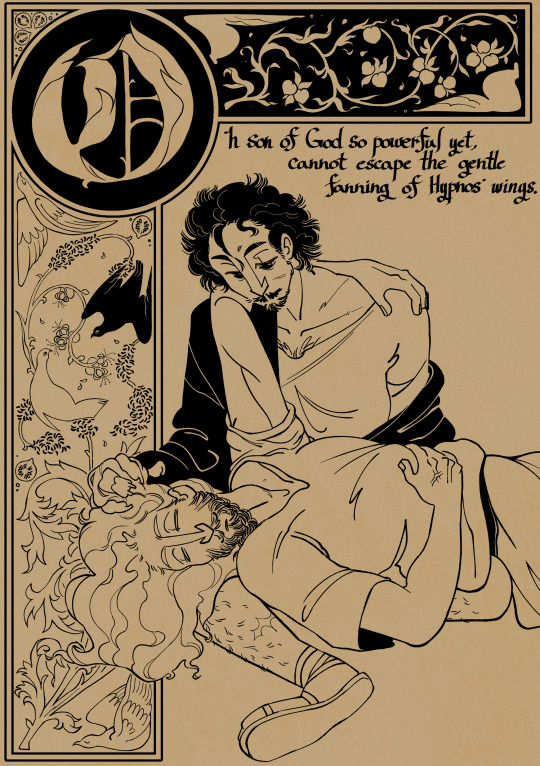
Close-ups under cut. ;P



Text: Oh Son of God so powerful yet, cannot escape the gentle fanning of Hypnos' wings.
#jesus x judas#bible fandom#art#jedas#judas iscariot#Jesus Christ#I know Hypnos is greek#just let me have this#This is moreso an exploration of Jesus' humanity tbh#Everyone must sleep Everyone must rest
453 notes
·
View notes
Text
The ways Zeus is characterised in ancient sources is ~ fascinating ~ to me.
The overbearing patriarch of the Iliad who keeps his godly family in check with constant threats of abuse and domestic violence. The conciliatory diplomat of the Odyssey, acquiescent to the desires and honours of his fellow deities. The ideal king of the Theogony, commonly elected, virtuous alloter of good and evil. The frightened tyrant, the cruel tormentor of Prometheus Bound. The all-encompassing orphic entity, who swallowed down and brought forth and is the entirety of the cosmos. The enigmatic, ambivalent, and sometimes undignified figure who refuses to appear on stage. The embodiment of righteousness, of majesty, the ultimate good, the promoter and dispenser of justice, the adulterer, the rapist, the upholder of oaths who perjures himself in the name of "love".
Above all the mastermind, the constant plotter, whose plan and will [Διὸς βουλή] permeate greek literature from epic to philosophy, whether it be synonymous with fate or not.
This is why I generally dislike simplistic takes on him. Sure, almost any way you choose to characterise him will probably have a sourced basis, his multifaceted "identity" almost guarantees it. But the massive loss of complexity is so disappointing imo.
#zeus#evidently it's impossible to reconcile every facet#nor would I want to see a rapist who embodies goodness and virtue#but maybe something other than cartoonish villain or sex joke or literally Jesus Christ#still I can understand he can be a very difficult character to portray#there's as many dimensions to him as the are conceptions of power#greek mythology#greek myths#greek gods#tagamemnon#hellenic deities
181 notes
·
View notes
Text
When the human known to us as Christ arrived in the underworld, gods and shades alike were horrified. It was always a big deal when demigods arrived in the underworld, but this one had died so brutally, a young man, not even old enough to grow a beard, tourtued to death at the will of his own divine parentage, the blood dripping from his shade's hands.
The high gods of the underworld brought him up to their tower to figure out what happened. Christ had recoiled from them at first, thinking they were Devils, but had to take Anubis's hand to ascend the tower's steps, as his legs were badly wounded. The gods of the dead looked at him with both sympathy and horror, it was the first time a he had seen a god look at him with either of those emotions.
Hades swore that this was his brother's doing, but even then it crossed a new line. The description of a god impregnating a young girl in Bethlehem fit what Hades knew of Zeus, but to harm his own son in such a way, as part of a ploy to try to gain all of Rome for him alone, had proven his brother's reign growing darker. Still, he took mercy on the young man, promising him at least three days safety in the underworld without his father trying to claim him again. Hades wondered if the poor girl knew when she held her child that he was born to suffer and die, just as the mothers of great heros knew their destiny. Hades hoped Chrsit would have a chance to stay longer, his wife would return in the fall, and he had the same kind eyes as her, she would probably like to know him.
Hel came to comfort Christ once he had a chance to rest. She helped tend his wounds, and pet his head, and for the first time christ was held by a divinity that didn't expect anything from him. And she told him stories of her father to cheer him up after meeting with such a horrible fate. And she told him that no father should ever do such a thing as what his father had done to his child, that if she had known in time she would have saved him. And she let him be comforted as a human, instead of being a lord of all humanity. And for a momment he didn't have to be the son of god who felt alone while bleeding and dying, but the son of the carpenter Joseph who had been reminded of home when he felt the wood of the cross.
He wasn't allowed to stay, his father wanted him back, back to be the bleeding prince of a new and lonely kingdom. And the underworld wept for him, not because the underworld was deprived of Christ, but because Christ was deprived of the underworld.
#196#my thougts#worldbuilding#writing#my writing#my worldbuilding#urban fantasy#myth#mythology#norse mythology#greek gods#greek mythology#norse paganism#norse gods#paganism#hel#hel goddess#hades#jesus#jesus fandom#short story#short fiction#flash fiction#gods#anti christianity#christanity#bible fandom#bible fanfiction#mythology and folklore#folklore
207 notes
·
View notes
Text
Could anyone pray for me and my mom?
My mom, has been working a very harsh job under INHUMAN timetables, and after a fire accident she had, her left arm is in trouble. Blood vessels of hers has been injured by the heat and sometimes due to tiredness and pressure she experienced, her arm doesn't seem to function well, she visited doctor a few days ago and she will quit her job soon, until then pray so her arm can be healed
And for me. Since school started I'm going through periods of deep depression and stress. I face a harsh daily in school (for which I'm not willing to go into depth) and I just don't feel myself anymore and just imagine its not even a the second month of school! I've fallen into sin and past addictions and I lost all motivation and (mental) strength for God. I try to get up and keep on going but it's so difficult when I hardly get out of bed everyday. I've started feeling like I'm not even a real Christian anymore and when I try to fix things I always fail
#christianity#orthodox christianity#jesus christ#god#jesus#christian faith#yeshua#greek orthodox#eastern orthodox#christian#prayer request#prayer
138 notes
·
View notes
Text

Midnight Office followed by Liturgy at 1 am
#orthodox christianity#greek orthodox#russian orthodox#orthodox#orthodoxy#eastern orthodoxy#chrsitianity#jesus christ#jesus#christ#theotokos#iconography#icons#liturgy
133 notes
·
View notes
Text

📕 Link in bio 📕
🎓 biography 🎓
Eli Kittim is a Bible scholar and an award-winning author of the Nonfiction Book, The Little Book of Revelation: The First Coming of Jesus at the End of Days. He has published articles in numerous prestigious journals and websites, including Rapture Ready, the Journal of Higher Criticism, The American Journal of Psychoanalysis, the Aegean Review (which has published work by Jorge Luis Borges, Lawrence Durrell, Truman Capote, and Alice Bloom) , and the International Poetry Review (a literary translation journal that has published work by Philip Sherrard), among others. Eli Kittim has studied Biblical Studies at Koinonia Institute and Liberty University's John W. Rawlings School of Divinity. He was born in Athens, Greece, but now lives in New York.
#the little book of revelation#elikittim#book#biography#research#book author#christian bible#christian book#bible study#Xlibris#endtimes#bible prophecy#Eli of Kittim#ελικιτίμ#the greek Jesus#theology#the Kittim Method#Kittim eschatology#signs of the times#the future incarnation of Christ#a reinterpretation of Jesus#το μικρο βιβλιο της αποκαλυψης#the little book of revelation dot com#the first coming of Jesus at the end of days#antichrist#four horsemen of the apocalypse#armageddon#last days#the judgement day#the apocalypse
1 note
·
View note
Text
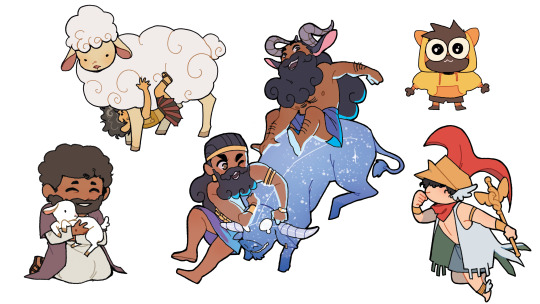
hehehe new charm designs
3K notes
·
View notes
Text
People outside the EPIC fandom see Odysseus and say “Jesus?!”
I, someone who’s in the EPIC fandom, see Jesus and go “Odysseus?!”
#epic#epic the musical#epic: the musical#the odyssey#greek mythology#jesus#odysseus#fanart#my post#jorge rivera herrans
108 notes
·
View notes
Text
*bangs head on the table repeatedly* Why. Do. The. Brothers. And. Sisters. Of. Christ. Love. To. Hate. Each. Other. So. Much.
You're Christian. I'm Christian. They're Christian. We all believe Jesus is God. We all believe God is love. Why all the hate?? So what if they believe Mary was assumed into heaven and you don't? So what if you believe Mary was ever a virgin and you don't?
There are lots of things we disagree on. But you know what? We agree on so much more!
We believe in one God, the Father almighty, maker of heaven and earth, of all things visible and invisible.
We believe in one Lord Jesus Christ, the Only Begotten Son of God, born of the Father before all ages. God from God, Light from Light, true God from true God, begotten, not made, consubstantial with the Father; through him all things were made. For us humans and for our salvation he came down from heaven, and by the Holy Spirit was incarnate of the Virgin Mary, and became man. For our sake he was crucified under Pontius Pilate, he suffered death and was buried, and rose again on the third day in accordance with the Scriptures. He ascended into heaven and is seated at the right hand of the Father. He will come again in glory to judge the living and the dead and his kingdom will have no end.
We believe in the Holy Spirit, the Lord, the giver of life, who proceeds from the Father, who with the Father and the Son is adored and glorified, who has spoken through the prophets.
We believe in one, holy, universal and apostolic Church. We confess one Baptism for the forgiveness of sins and we look forward to the resurrection of the dead and the life of the world to come. Amen.
We are all Christians for we are all anointed by the Anointed One, the Son of the Living God.
#christianity#christian#bible#faith#faith in jesus#bible scripture#keep the faith#jesus christ#jesus#catholic church#catholicism#catholic#roman catholic#orthodox#eastern orthodox#orthodox church#greek orthodox#orthodox christianity#russian orthodox#protestant#protestantism#christians#religion#assumption#oriental orthodox#holy spirit#repentance#progressive christianity#progressive christian
120 notes
·
View notes
Text
i keep thinking about the odyssey i am THINKING about wei wuxian as odysseus. you were dead. its been years since you’ve seen your family. the child you left behind is almost a man. you wear a face they don’t recognise, you sneak in through the back door. the dog gives your identity away. the world knows it’s you when you draw your weapon. the person you love recognises you by the original symbol of your love—a secret that no one else in the world knows about, still, because they kept it safe for all these years. you get the chance to go back and despite everything, you found home waiting for you; he kept your place and raised your son and he was still there waiting for you when you got back. tell me o muse, about a complicated man i am extremely not okay
#cql#mdzs#wangxian#wwx#lwj#meta stuff#greek mythology#i am not fine i am not sane in the slightest#no idea if i’ve posted something similar to this before#i definitely started my odyssey journey thinking about them but then i got sidetracked with. the actual odyssey#i have been on an absolute greek tragedy bender though so there’s. plenty more to come. but also. HHHHH#the dog thing is so silly but i couldn’t help keeping it in because that is SO funny#this is soooo self indulgent i am sorry for subjecting u all to this#thank u to helendamnation my beloved for listening to all my rambling this weekend about this#jesus. home waited. the odyssey is about many things but it is about a man coming home.#and despite everything. he gets to come home. and he gets it because his home waited for him.#despite him being dead. despite the gods. despite the suitors and the pressure and the doubt.#in most stories home moves on without you but this time. this one time. home waited.#homeric hyperfixation haze
2K notes
·
View notes